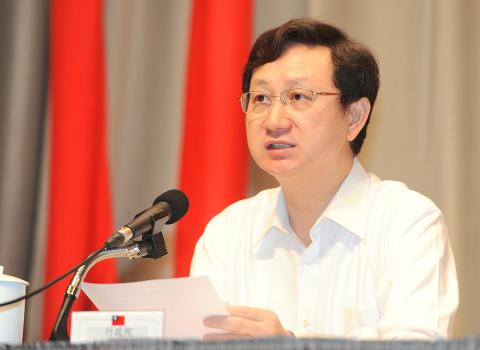The Cabinet yesterday passed amendments to the Labor Standards Act (勞動基準法) proposed by the Ministry of Labor, which would introduce “one fixed day off and one flexible rest day” — or yili yixiu (一例一休) — as two weekly days off to guarantee the realization of the 40--hour work week policy, while canceling seven days off for national holidays.
“With efforts from the Ministry of Labor, Executive Yuan staff and the Democratic Progressive Party [DPP] caucus, we have finally produced this version [of amendments]. Despite all the difficulties, it is a more feasible version that would lead to as little conflict as possible,” Premier Lin Chuan (林全) was quoted as saying by Cabinet spokesman Tung Chen-yuan (童振源) in a post-meeting news conference. “However, there are still differences of opinion, and we need to continue to communicate with the public.”
According to the ministry’s proposed amendments, employers may ask employees to work on their “fixed day off” only in the event of a natural disaster or emergency, and would have to compensate employees with double salary for the day plus an additional day off to make up for it.

Photo: Chang Chia-ming, Taipei Times
Regarding the “flexible rest day,” employers may ask employees to work after obtaining their consent, but are obligated to provide additional pay, ranging from one and one-third to one and two-thirds times the worker’s basic salary.
However, employees would not get an extra day off if they work on a “flexible rest day.”
Moreover, the proposal would also cancel seven holidays for workers to make all workers, including civil servants, enjoy the same number of national holidays.
The Cabinet’s final amendment proposals drew fire from both labor rights advocates and businesses.
Labor rights activists have been calling for two fixed days off per week and to keep the seven national holidays, while businesses have complained about the high overtime pay they have to offer employees to have them work on a “flexible rest day.”
The seven holidays that the ministry proposed to cancel were also a point of dispute as the government has revised its stance about whether to keep the holidays several times, and has been accused by labor activists of breaking its promise.
Separately, DPP caucus chief executive Wu Ping-jui (吳秉叡) said after a lunch meeting with the premier that the caucus would seek to pass the amendments in September.
“The premier would like the amendments to be passed as soon as possible, so that businesses can more accurately calculate their costs,” Wu said.
He said that not all caucus members supported the proposals, but added that working conditions would improve with the amendments, as they would require employers to provide more overtime pay and obtain consent from their employees to have them work on their rest days.

ENDEAVOR MANTA: The ship is programmed to automatically return to its designated home port and would self-destruct if seized by another party The Endeavor Manta, Taiwan’s first military-specification uncrewed surface vehicle (USV) tailor-made to operate in the Taiwan Strait in a bid to bolster the nation’s asymmetric combat capabilities made its first appearance at Kaohsiung’s Singda Harbor yesterday. Taking inspiration from Ukraine’s navy, which is using USVs to force Russia’s Black Sea fleet to take shelter within its own ports, CSBC Taiwan (台灣國際造船) established a research and development unit on USVs last year, CSBC chairman Huang Cheng-hung (黃正弘) said. With the exception of the satellite guidance system and the outboard motors — which were purchased from foreign companies that were not affiliated with Chinese-funded

PERMIT REVOKED: The influencer at a news conference said the National Immigration Agency was infringing on human rights and persecuting Chinese spouses Chinese influencer “Yaya in Taiwan” (亞亞在台灣) yesterday evening voluntarily left Taiwan, despite saying yesterday morning that she had “no intention” of leaving after her residence permit was revoked over her comments on Taiwan being “unified” with China by military force. The Ministry of the Interior yesterday had said that it could forcibly deport the influencer at midnight, but was considering taking a more flexible approach and beginning procedures this morning. The influencer, whose given name is Liu Zhenya (劉振亞), departed on a 8:45pm flight from Taipei International Airport (Songshan airport) to Fuzhou, China. Liu held a news conference at the airport at 7pm,

Authorities yesterday elaborated on the rules governing Employment Gold Cards after a US cardholder was barred from entering Taiwan for six years after working without a permit during a 2023 visit. American YouTuber LeLe Farley was barred after already being approved for an Employment Gold Card, he said in a video published on his channel on Saturday. Farley, who has more than 420,000 subscribers on his YouTube channel, was approved for his Gold Card last month, but was told at a check-in counter at the Los Angeles International Airport that he could not enter Taiwan. That was because he previously participated in two

SECURITY RISK: If there is a conflict between China and Taiwan, ‘there would likely be significant consequences to global economic and security interests,’ it said China remains the top military and cyber threat to the US and continues to make progress on capabilities to seize Taiwan, a report by US intelligence agencies said on Tuesday. The report provides an overview of the “collective insights” of top US intelligence agencies about the security threats to the US posed by foreign nations and criminal organizations. In its Annual Threat Assessment, the agencies divided threats facing the US into two broad categories, “nonstate transnational criminals and terrorists” and “major state actors,” with China, Russia, Iran and North Korea named. Of those countries, “China presents the most comprehensive and robust military threat